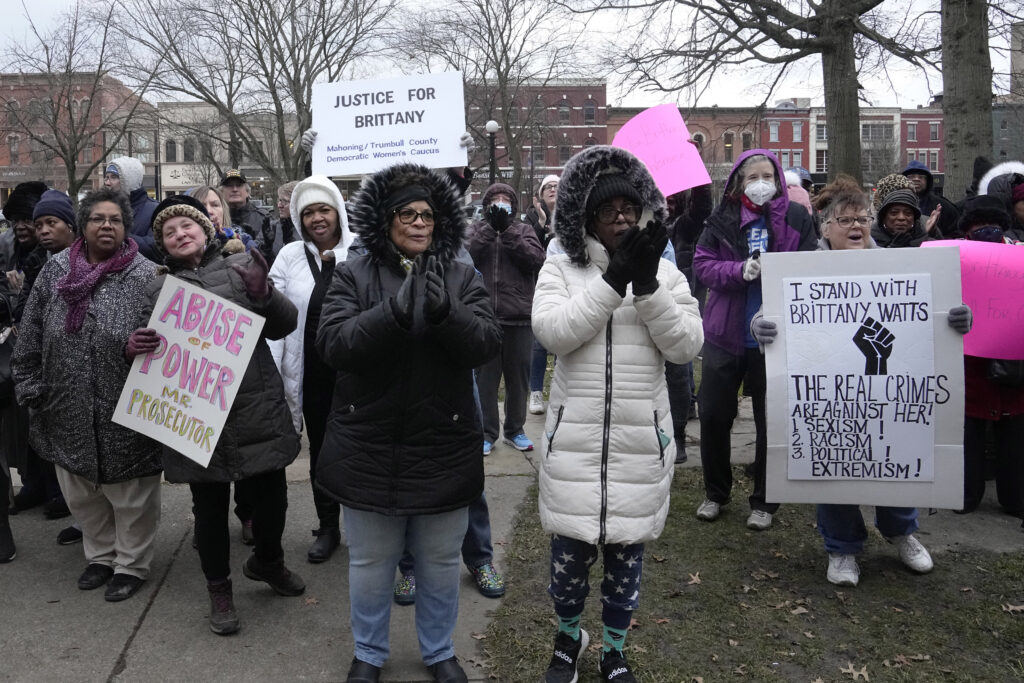WARREN, Ohio — A Trumbull County, Ohio, grand jury on Thursday decided to not indict a Black mother who miscarried in her home and was charged with abuse of a corpse, marking a victory in the ongoing national effort toward reproductive rights in the wake of Roe v. Wade being overturned.
Brittany Watts, 34, was told her pregnancy was not viable by medical professionals at a hospital last September, but they subsequently left her waiting for many hours after that, prompting her to return home, where she miscarried.
Reproductive freedom advocates like MomsRising.org and Ohio Physicians for Reproductive Freedom raised their voices last year for Watts, who could have faced a felony trial after passing her fetus in her bathroom. The advocates wrote letters to county officials urging them to not criminally charge the mom of three. In Ohio, a fifth-degree felony abuse of a corpse carries a one-year prison sentence and $2,500 fine.
“The grand jury’s decision is a firm step against the dangerous trend of criminalizing reproductive outcomes,” said Dr. Marcela Acevedo, president of Ohio Physicians for Reproductive Rights (OPRR), in a statement posted to X on Thursday.
“This practice must be unequivocally halted,” she continued. “It not only undermines women’s rights but also threatens public health by instilling fear and hesitation in women seeking necessary medical care during their most vulnerable moments.”

Watts’ supporters say the case carries themes of disparities in how Black patients are treated by the medical community and authorities.
RELATED: In an abortion-to-prison pipeline, Black women will be the losers
The event began unfolding in late September 2023 when Watts experienced severe bleeding 21 weeks into her pregnancy and sought medical attention at Mercy Health — St. Joseph Warren Hospital in Warren, a city of 40,000 outside of Youngstown. An examination revealed Watts’ water broke early, resulting in the loss of amniotic fluid and an infection, which put her at risk of miscarriage, the Associated Press reported. Doctors recommended inducing labor, but delays and complications prompted Watts to leave the hospital, her lawyer, Traci Timko, told the AP.
Days of severe bleeding and pain forced Watts to return to the hospital, only to be left waiting several hours as medical staff debated how to induce labor for a woman diagnosed with preterm rupture of membranes with no detectable amniotic fluid, vaginal bleeding and advanced cervical dilation, according to a Washington Post report. Ohio law deems abortions legal until 22 to 24 weeks of pregnancy; after that, the state can legally restrict abortion access unless the patient’s life or health is at risk.
Watts left the hospital after being told her baby was not viable, prompting a nurse to contact emergency responders, who showed up to Watts’ home after she passed the fetus in her bathroom, according to published reports.
Authorities removed the toilet, retrieving fragments of the fetus, and an autopsy revealed the cause of death as intrauterine fetal demise due to severely low amniotic fluid, CNN reported.
Trumbull County prosecutors charged Watts with abuse of a corpse, which Ohio law defines as “treatment in a way that person knows would outrage reasonable family sensibilities.” However, Watts’s attorney said the law does not require a mother suffering a miscarriage to bury or cremate the remains.

“(Brittany) has vowed she will do everything in her power to make sure her story is an impetus to change — we don’t stop here,” Timko told about 150 people at a rally in Warren Thursday to celebrate the grand jury decision.
“She has an enormous sense of community, an enormous sense of faith, and she believes that when we know better, we do better,” Timko continued.
Watts told the crowd at Thursday’s rally that love and support from the Warren community by way of calls, emails and letters helped her endure.
Watts, dressed in a pink winter coat and white hat, thanked God and her community for showing up when she was most vulnerable.
“I was born here, I was raised here, and I graduated from high school here and I’m going to continue to stay here because I have to continue to fight (for reproductive rights of all),” Watts said.
Word on the grand jury’s decision spread quickly on social media and through national news. The panel’s ruling that there was not sufficient evidence for a trial came two months after 57 percent of registered Ohio voters passed the Reproductive Freedom Amendment, known as Issue 1, that enshrined reproductive rights and protections into law. Reproductive justice advocates like OPRR, a nonpartisan coalition of 4,000 doctors and healthcare professionals, have taken a stand against government intrusion on private healthcare decisions and patient rights.
Causes of miscarriage vary from chromosomal abnormality, hormonal problems, infections, maternal health problems, maternal age, maternal trauma, lifestyle or improper egg implantation in the uterus. Much attention has been drawn in recent years to the higher rates of miscarriage among expectant Black women. In 2021, The Lancet medical journal reported Black mothers have a 43 percent increased risk of miscarriage over white women.
During the rally supporting Watts, Lea Dotson, co-founder of Warren-based political organization I Vote Black, gave historical context for the United States healthcare system’s mistreatment of women of color compared to other races.
“This is the implicit bias that enabled a nurse to forgo empathy and care for Brittany only to be superseded by the belief that she was negligent or malicious in any way during this ordeal,” Dotson said. “And when doctors are put in a position where they have to debate helping a woman with a life-threatening condition due to fear of their own prosecution, something is wrong with that and something is wrong with America.”
Terricha Phillips is a freelance journalist for Black Girl in the CLE based in Cleveland, Ohio. She has produced news and features stories for Columbia Journalism Review, Parents & Kids Mississippi magazine, and newspapers in Rochester and Syracuse, New York, Mansfield and Bucyrus, Ohio, and Jackson, Mississippi.








